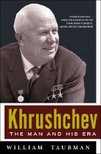Khrushchev by William Taubman
 This is a recent biography of Nikita Sergeyevitch Khrushchev, written in English and taking advantage of all the recent scholarship and documents made available in Russia. In addition, the author worked extensively with Sergei Khrushchev, the son who is now an American citizen.
This is a recent biography of Nikita Sergeyevitch Khrushchev, written in English and taking advantage of all the recent scholarship and documents made available in Russia. In addition, the author worked extensively with Sergei Khrushchev, the son who is now an American citizen.Khrushchev celebrated his birthday on 17 April (when his birth was registered) but was actually born on 15 April 1894 (or 3 April by the old style calendar used before the revolution) in the small village of Kalinovka in Southern Russia. He lived there until 1908 when he moved to the eastern Ukranian town of Yuzovka where his father worked in the mines.
But the biography doesn’t begin with his birth, rather with this paragraph: “Ask many Westerners, and not a few Russians, and they’re likely to recall Nikita Khrushchev as a crude, ill-educated clown who banged his shoe at the United Nations. But the short, thick-set man with small piercing eyes, protruding ears and apparently unquenchable energy wasn’t a Soviet joke even though he figures in so many of them. Rather, he was a complex man whose story combines triumph and tragedy for his country as well as himself.”
There is no film and no still picture of Khrushchev banging his shoe at the UN, though most people in attendance that day in October of 1960 agreed that he did slip off his shoe (a loafer type) and wave it around. Some will swear he banged it on the desk to emphasize his point and others will vociferously deny it. All will probably agree that both the waving and the banging were Khrushchev-like gestures.
Khrushchev is most remembered by those interested in Soviet history for his “secret speech” at the 20th annual Congress (1956) of the communist party when, in a session open only to high ranking communist members from the USSR, Khrushchev spoke for 4 hours attacking Stalin and the abuses of power which had become everyday occurrences in the USSR. For someone who had risen to power under Stalin and participated in the central government during the 30ies and 40ies, it was almost unthinkable. Khrushchev told his audience how thousands and thousands of citizens had been arrested, tried in completely illegal trials, and then deported to labor camps or executed. The counter-revolutionary charges were always “absurd, wild and contrary to common sense.” Characteristic of Khrushchev, the speech was bold—even rash—daring. No one but Khrushchev in his generation could possibly have been imagined to do such a thing. It was undoubtedly both the smartest and the dumbest thing he ever did.
I always thought that the CIA lucked out and got a copy early on—not that they had much clue what the speech meant. In fact, Khrushchev arranged for it to be subtly leaked, first to the rest of the communist bloc and then to the rest of the world.
But Khrushchev’s whole story is far more interesting than just the secret speech. Taubman says that “beneath the surface Khrushchev’s efforts at de-Stalinization, awkward and erratic though they had been, had allowed a nascent civil society to take shape where Stalinism had once created a desert.” His efforts at reform and his reaching out to the rest of the world paved the way for Gorbachev and Yeltsin in the next generation. Even though he boasted that the grandchildren of Americans would live under communism (and it ended up that his own son is now lives under capitalism), in spite of the naiveté and the bluster and the inconsistencies, Khrushchev left an important legacy. In a 1998 poll of young Russian adults who were asked to evaluate their 20th century leaders, most (Lenin, Stalin, Brezhnev but also Gorbachev and Yeltsin) were considered to have done more harm that good while Tsar Nicholas II was assessed positively. Opinion on Khrushchev was evenly divided. Though they were surely wrong about the Tsar, they at least recognized in Khrushchev something which made an important impression.
If you’re interested in Russian history of the 20th or 21st century, you couldn’t go wrong with this book. If you're interested in the cold war of the US in the 20th century, you shouldn't miss it either. It’s interesting—inspiring in spots—well-researched and well-written.


0 Comments:
Post a Comment
<< Home